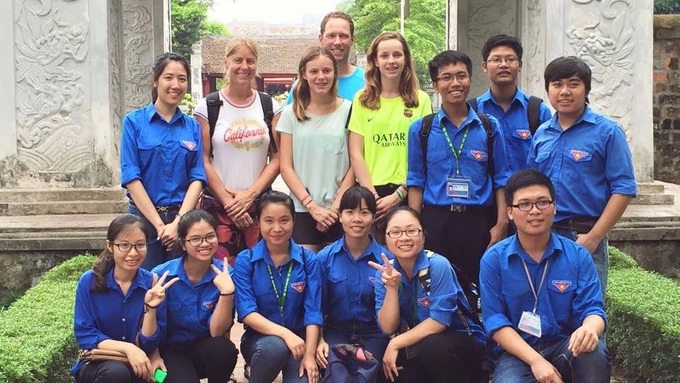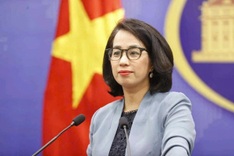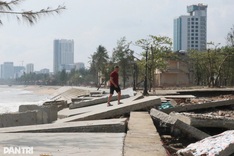
VietInfo Club’s members pose for a photo with foreign visitors (Photo: VietInfo Club)
The youngsters are members of the VietInfo Club of the University of Social Sciences and Humanities (USSH) under the Vietnam National University Hanoi.
According to the club’s head Trinh My Linh, the club was founded in August 2014, following an idea that came in 2010 when USSH students joined volunteer teams to work as tour guides for visitors to Hanoi on the millennium anniversary of the capital city.The club has brought together around 70 active students who are fluent in English and have an interest in history, culture as well as sharing a love for Hanoi.
The students are divided in three teams who are currently operating at the Imperial Citadel of Thang Long, the Ho Chi Minh Museum and the National Museum of Vietnamese History every Saturday and Sunday.
Nguyen Thanh Tra, a club member, started her weekend by arriving early in the morning at the entrance gate of the Imperial Citadel of Thang Long. Today, Tra joined ten other members to welcome visitors to the citadel.
The first visitors to the citadel were an older foreign couple. Tra approached them to say hi and said that she and her friends would like to help them discover the citadel – a world heritage in Vietnam.
After the visitors accepted, experienced members were assigned to lead the group. New comers of the club follow the veteran members to learn from them before they are in charge of a tour.
Tra can lead up to three tours a morning. According to her, introducing visitors to Thang Long Imperial Citadel is a challenge. Unlike other popular tourist attractions in Hanoi, such as the Temple of Literature, there are not many ancient architectural features remaining at the citadel today, which may lead visitors to think that the site has “nothing to discover”.
“There is a vast gap between the citadel’s treasure value and the public awareness about it. We have to try hard to help people understand the real values,” Tra said.
She shared that she had to look up information about feudal dynasties and the citadel’s buildings.
“We also asked for help from our lecturer Dr. Pham Le Huy in order to enrich our knowledge,” Tra said.
To support the club’s operation, the university’s lecturers have closely worked with the management boards of the three sites so that their students can receive training on presentation skills and background knowledge in order to work as tour guides.
Surprising questions on the structures at Thang Long Imperial Citadel, antiques on display at museums, or stories about Uncle Ho are often asked by visitors, requiring the amateur tour guides to read more and learn more to equip themselves with understanding about the sites.
While taking tourists around, VietInfo members also include in their presentations interesting facts about the capital city of Hanoi and Vietnam in general.
Nguyen Hoang Tra My, who joined the club in its very first days, said that being a member of the club brings many benefits to her since she has more chances to exercise communication skills, learn more new things, and improve her English.
She said she is also happy to contribute to teaching visitors about Hanoi and Vietnam.
VietInfo Club has helped build an image of Hanoi as a friendly and civilised city.The club’s head Trinh My Linh said “We believe that every word we say and every action we take represent the image of Hanoi youth in the eyes of visitors. We always try to do the best we can.”




















